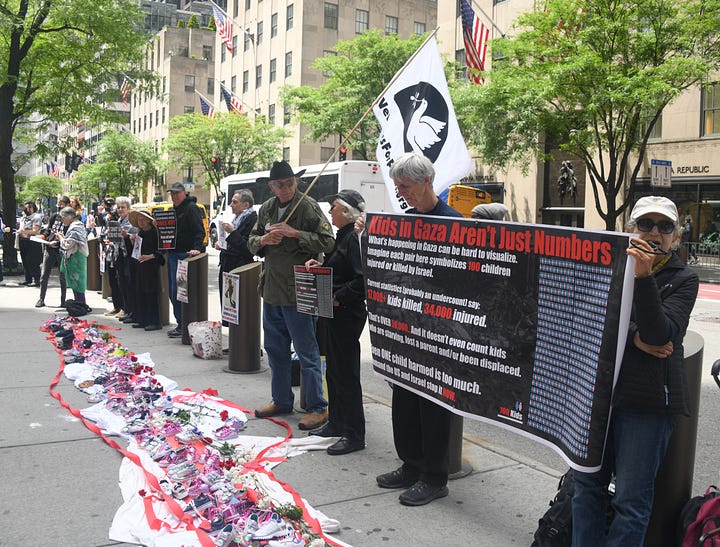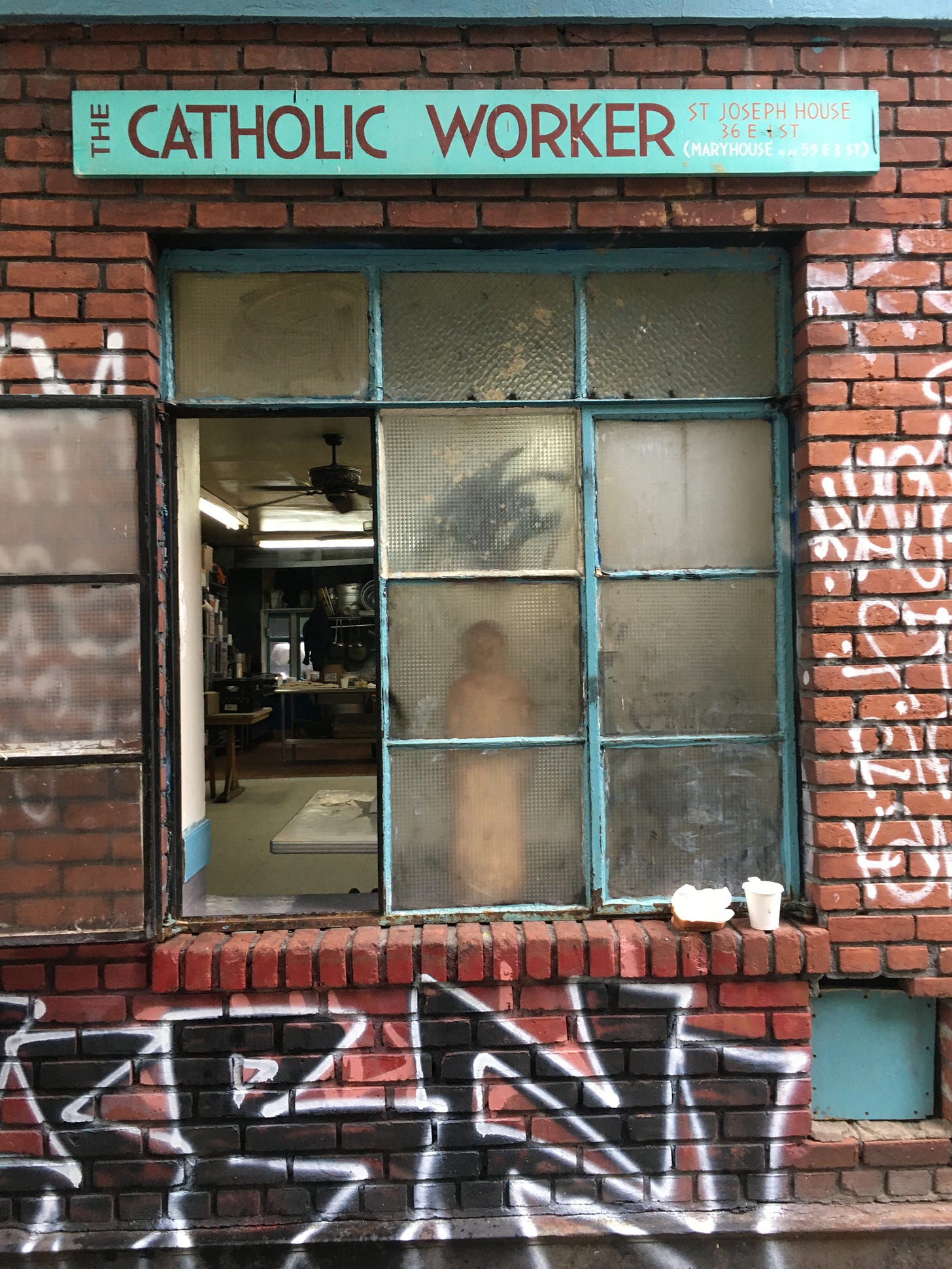"Community is the best defense we have"
Inside: help us clean house at catholicworker.org; Harry Murray's study on the sociology of St. Joseph's House of Hospitality; London Catholic Workers on the Calais "jungle" and a culture of death
Grab a bucket and a sponge…it’s cleaning day at CW.org
At Roundtable, we like to say we “cover the Catholic Worker”—but the truth is, we cover only a tiny fraction of what goes on in CW communities around the world every week. Much of the movement’s real work isn’t flashy or headline-grabbing; it’s mopping floors, cooking meals, mowing lawns, scrubbing toilets, and filing paperwork—all the mundane work of keeping a household going.
Well, Reneé recently referred to CatholicWorker.org as a “digital house of hospitality,” which is apt, because, like any house, it needs regular cleaning, maintenance, and upkeep. So, this summer, we’re launching a major cleanup effort, and in good Catholic Worker spirit, we’re inviting our community to help.
This project has two parts. First, we’re refreshing the Dorothy Day Library on the Web, the online, searchable repository of every one of Dorothy’s 800+ columns from The Catholic Worker newspaper.
When Jim Allaire and a few dozen volunteers launched the site in the 1990s, adding these articles to the database often involved manually typing them (while referring to physical copies of the paper). Sometimes, they used early OCR technology to scan the articles, but even this method required substantial proofing and correction. All that hard work got the library up and running. Quite understandably, a few typos and other formatting issues snuck in; now, we’d like to proof each of Dorothy’s writings against the text of the original article, making corrections as needed. At the same time, we want to revisit (and possibly improve) the article summaries, and we want to add subject tags that will eventually feed into a topical index. Additionally, we have permission from the Catholic News Archive to post images of the original printed version of each article to accompany the text. We’re looking for people willing to do the proofreading as well as a few people willing to help post the corrected articles (and their accompanying images) to the website.
The second part of this summer’s project involves cleaning up the community directory—more than 180 listings. Some communities have changed, closed, or evolved beyond the Catholic Worker tradition. Many listings are outdated. For this part of the project, we’re looking for volunteers willing to contact communities to verify that they still identify with the movement and that their listing information is correct.
The Catholic Worker is not a centralized movement, but rather a grassroots, anarchist movement. There are no presidents or secretaries, membership dues or registries, and there is also no “official” website. Nevertheless, many curious visitors depend on CatholicWorker.org’s resources. The site draws upwards of 15,000 unique visitors a month, many of them students, scholars, or people looking to connect with a local community. Improving the accuracy and usability of these resources will, I hope, spread Dorothy and Peter’s nonviolent revolution of the heart.
If you’re ready to help, sign up using the volunteer interest forms below. Projects kick off in July and will wrap by year’s end (or so we hope, ha ha).
Thanks in advance for helping maintain our digital house of hospitality.
—Jerry
FEATURED
A Sociologist’s Immersion at a Catholic Worker
This upcoming month, Roundtable will serialize a chapter from Harry Murray’s “Do Not Neglect Hospitality: The Catholic Worker and the Homeless” in our CW Reads section.
Murray is an emeritus professor of sociology at Nazareth College in Rochester, New York. “Do Not Neglect Hospitality,” published in 1990 by Temple University Press, shares Murray’s sociological research embedded in three different Catholic Worker communities from 1982 to 1984.
Murray opens his book with a personal story of his first visit to St. Joseph’s House of Hospitality in New York City in 1976. What he encountered offered a hint of how rich a house of hospitality could be for a study of social relationships. During their visit, Murray and his friend tried to figure out “who was actually running the place.”
When I asked the people who were sitting around who they were, they replied, ‘We’re Catholic Workers, helping those people over there.’ The response became bewildering, for when I talked to ‘those people over there’ they too replied, ‘we’re Catholic Workers helping those people over there,’ and would point to the group I had just come from."
Confronting the Culture of Death
In Thursday’s CW Reads, Moya Barnett, a current volunteer at the London Catholic Worker, reflected on her experience as a volunteer at the Maria Skobtsova House in the Calais refugee camp. In her reflection, she meditates on the experience of mediating racially-charged conflicts among the refugees as a white-skinned person: particularly the questions it prompts about her own privilege.
In a second essay, Tom Dennehy-Caddick, a former live-in community member, reflected on the 2024 election of Keir Starmer as Prime Minister, and the feeling of being politically homeless in a state and society that fosters death rather than life, particularly in deeming the lives of the sick or elderly worthless or candidates for assisted suicide. Politically homeless, maybe, but politically helpless, not so much, he suggests. Bearing our neighbor’s burdens, taking personal responsibility for their well-being, seeing in the opportunity to care for them a chance to worship God and change the world may be a more politically radical act than it appears.
COMMUNITY NEWS & NEWSLETTERS


San Bruno Catholic Worker Celebrates 30 Years
This June marks the 30th anniversary of the founding of the San Bruno Catholic Worker, and in its latest news update, co-founder Peter Stiehler reflected on how it all began. Larry Purcell and Jan Johanson of the Redwood City Catholic Worker had raised funds to help launch a new Catholic Worker house; Peter and his wife, Kate Chatfield, then members of the Los Angeles Catholic Worker, were looking to start a new community. They met during the younger couple’s honeymoon in June 1995 and moved into what would be the community’s house later that year. Read the whole piece on the San Bruno Catholic Worker website.
Andre House Remembers Volunteer Kathy Gibbons
Andre House (Phoenix, Arizona) held a funeral at the house for longtime community member Kathy Gibbons on Friday. Gibbons, who had volunteered with the community for decades, passed away on May 5. The community remembered her on social media:
She enjoyed preparing our houses for visitors, break groups, summer interns, and Core members. She taught her grandson how to answer the men’s house door with kindness—offering blankets, cups of water, and a friendly how are ya. Lately she was often doing assorted chores at the building, anything from bagging dog food to folding laundry. She did every action, however small, with great intention. Her commitment to hospitality and the André House community was recognized with a special Volunteer Appreciation Award at André House’s 30th Anniversary Celebration.
Read the full post on Facebook.
Iowa City Catholic Worker Completes Basement Renovation
The Iowa City Catholic Worker reports that it finished its basement renovation: “The newly finished space includes two bedrooms, a bathroom, living space, and laundry room—creating a warm and welcoming home for a family of four who will be moving in Saturday,” the community wrote on Facebook. See pictures at the post.
Separately, 25 Iowa City CW members accompanied nearly a dozen people to their mandatory ICE check-in on Tuesday; two were told they never have to check in again. See the full post here.
The Catholic Agitator Celebrates 55 Years
“Celebration as resistance” is the theme of the June 2025 issue of The Catholic Agitator, which focuses on celebrating the 55th anniversary of the Los Angeles Catholic Worker’s founding. In a front-page reflection, former community member Tensie Hernandez recalls her own journey to the Worker, sparked by a chance encounter with a street liturgy and a meal shared at the kitchen in 1986. Also, Jeff Dietrich recounts more than five decades of radical hospitality, resistance, and community-building alongside his wife, Catherine Morris, noting how their “empire” is not of power but of sister houses and mutual aid.
“We know that celebration is a must, dancing is a must, bread broken and shared together is a must,” Matt Harper writes in another reflection. “Community is the best defense we have against everything this world has to throw at us.”
Read the full issue at the Los Angeles Catholic Worker.
LACW Remembers Rodkewich, Estrada, Walli
The Los Angeles Catholic Worker community honored the lives and legacies of three longtime friends in the June issue of The Catholic Agitator.
Sr. Elizabeth Rodkewich, OP, 86, a Dominican Sister of Sinsinawa and a beloved volunteer at the LACW’s Hippie Kitchen, died on April 4. A nurse by vocation, in retirement she dedicated herself to ministry among the poor, Mike Wisniewski writes. Sr. Elizabeth “thoroughly enjoyed working at our soup kitchen, especially buttering bread and talking with other volunteers, and spending time outside talking with our guests.”
Another longtime friend of the L.A. Catholic Worker, Fr. Richard Estrada, 83, passed away on March 31—the birthday of his friend, César Chávez. A longtime L.A. priest and activist, he founded Jovenes Inc., the city’s first shelter for unhoused immigrant youth. Estrada was a key leader in the sanctuary movement and remained a prophetic voice for justice throughout his life.
Michael Walli, 76, entered the U.S. Army at age 17 and served two tours in Vietnam, an experience that led him to reject war and dedicate his life to peacemaking. He joined the Dorothy Day Catholic Worker in Washington, D.C., in 1987, and spent most of the rest of his life there. “He upheld a Consistent Life Ethic, and was arrested countless times, including participating in two plowshares actions, and served more than five years in prison for his efforts and dedication to disarmament,” Wisniewski wrote.
Read the full articles in the June issue of The Catholic Agitator.
Little Platte Catholic Worker Farm Sends Second Newsletter
Little Platte Catholic Worker Farm shares updates—welcoming bees, Nigerian Pygmy Goats, and a new community member, Grace. Read the post on Substack here.
The Catholic Radical Decries Senseless Slayings in Gaza
The new edition of The Catholic Radical, from SS. Francis and Therese Catholic Worker in Worcester, Massachusetts, featured Scott Schaeffer-Duffy’s front-page call to cease the slaughter of Palestinians in Gaza—particularly the aid workers and medical professionals who have been killed unarmed. “The belief that a loving God created each of us as members of one human family comes into question when faced with such cruelty as the massacre of ambulance drivers in Gaza,” he wrote. Claire Schaeffer-Duffy writes about her work as an ICE verifier that brought her to the scene of a now-viral video of a group of neighbors in Worcester forming a protective shield, trying to prevent ICE from abducting a local mother. Learn more and subscribe online.
Simone Weil House Celebrates New Volunteers
The Easter and Pentecost newsletter from Simone Weil House (Portland, Oregon) featured a hand-printed woodcut icon of the Byzantine image of the Hetoimasia and also images from a community fashion show with their finds from the free bin in their front yard; invitation to a weekly Wednesday dinner and their online agronomic university study projects; and a reflection from their newest community member, Helia, from London. “Here, Weil’s insights become real: otherness becomes communion, and sharing the cross draws us into supernatural love.” Visit their website to learn more.
CW IN THE MEDIA
Brewing the Kingdom of God (and Kombucha)

“We are trying to create a business where everybody benefits, a truly just system,” the Lake City (Minnesota) Catholic Worker Farm’s Paul Freid told Agri-View in a lengthy profile of the farm republished this week on AgUpdate.com. “We want our soil to benefit. We want local growers to benefit. We want to produce products that are good for our consumers so we make kombucha, fermented tea.”
In the June 5 article by Jason Maloney, Paul and Sara Freid share how they’ve cultivated crops and community on their 52-acre homestead since 2007. The Freid family of five welcomes summer interns, housemates, guests, and hundreds of schoolchildren each year—many visiting a farm for the first time.
“We are not just out to make life better for ourselves,” Freid said. “We feel God is guiding us to help bring about the Kingdom right here, right now, through the food we grow, our hospitality, the people we welcome and the mission we have.”
That mission includes student farm visits through a partnership with the University of Minnesota’s Masonic Institute for the Developing Brain, as well as the kombucha business—John the Baptist Beverage Company—that reflects their commitment to local, just economies.
“Our most popular flavor is honey-lemon balm,” Fried told Agri-View. “The honey is from farms in our area and we grow the lemon balm.”
Read the entire article at Ag Update.
South Bend CW Installs Solar Energy System
The St. Peter Claver Catholic Worker (South Bend, Indiana), had a ribbon-cutting ceremony for a new solar installation on Tuesday. The project, developed in partnership with the City of South Bend and Wellspring Solar, is part of the city’s energy assistance and solar savings initiative. The solar energy system that will power the Catholic Worker house while promoting sustainability and energy justice, according to local news station WNDU, See their report here.
Art Exhibit Opens in Church Cloister

WORDS FROM THE ELDERS
“To Christ – To the Land”
by Dorothy Day, from the January 1, 1936, issue of The Catholic Worker
For those who have put to us the question “What have you to offer in the way of a constructive program for a new social order?” we have replied over and over, “Peter Maurin’s three-point program of Round-table Discussions, Houses of Hospitality, Farming Communes.” This program is so simple as to be unsatisfactory to most, who look for something to be complicated before it can be successful.
Remembering the words of St. Francis that we cannot know what we have not practiced, we have tried not only to publish a paper but to put our program into practice.
From the very beginning we have sought clarification of thought through The Catholic Worker, through round-table discussions, forums, through circulating literature. We have had a workers’ school where the finest scholars of the Church have come to teach. We have had a House of Hospitality now for two years, where we gave shelter to the homeless, fed the hungry, clothed the naked, and cared for the sick. We have tried, all of us, to be workers and scholars, and to combine work and prayer according to the Benedictine ideal. We have tried to imitate St. Francis in his holy poverty.
Our aim has been to combat the atheism of the day by our devotion to the liturgical movement; to combat the bourgeois spirit by the Franciscan spirit; to oppose to class-war technique the performance of the works of mercy.









I love and look forward to every edition of Roundtable. Love, Michael Doyle
Not all white skinned people are privileged. I find this concept unhelpful & divisive. We need a different word.